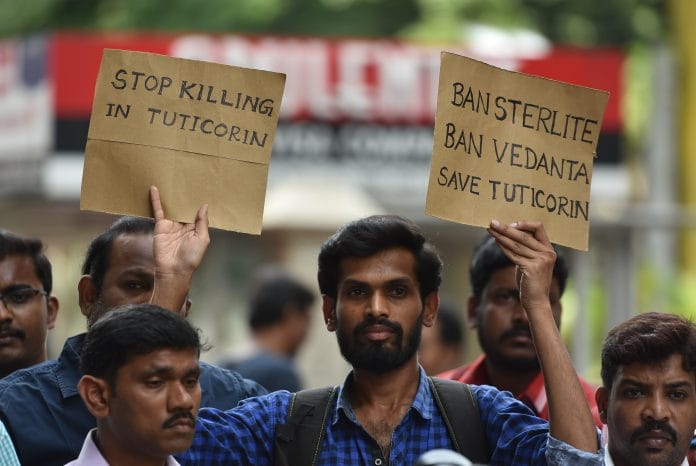The latest controversy centres on whether the Sterlite plant is located within an industrial area which already had environmental clearance, or not.
New Delhi: Protests against Sterlite Industries Ltd’s copper plant in Tamil Nadu’s Thoothukudi that came to a boil this week, leaving at least 11 people dead in police firing, have been simmering for over two decades. Regulators have failed to allay concerns of groundwater pollution by the plant that local residents have alleged is also responsible for gas leaks.
Several audits done by government agencies have raised red flags about the company’s hazardous waste-management and pollution-control measures and clearances granted by union and state regulators were challenged at every step.
The most recent controversy centres on an environmental clearance granted by the Union environment ministry to Sterlite Industries, now Sterlite Copper, in 2009 to expand the existing copper plant. The clearance was given after the company argued that since the upcoming second unit was within the State Industries Promotion Corporation of Tamil Nadu Ltd (SIPCOT) industrial area that already had an environmental clearance, the company did not need to hold public hearings to get another clearance.
“We do have all required permissions on ground to proceed with our expansion project,” Vivek Thomas, a spokesperson for Vedanta Ltd, said. Vedanta Ltd, the parent company of Sterlite Copper, is a subsidiary of the UK-based conglomerate, Vedanta Resources Plc. The Thoothukudi plant, set up in 1997, consists of a smelter, a refinery, a phosphoric acid plant, a copper rod plant and three captive power plants.
The Madras high court on Wednesday, however, ordered a stay on the expansion and directed that a public hearing be held. “We have been able to show that the expanded area is not part of SIPCOT, they cannot bypass the public consultation,” Shweta Narayan, an activist protesting against the plant, said.
The expansion of the plant, activists argue, will only add to the environmental damage and health risks. “Already, existing pollution and health impacts are not being addressed at all,” said Narayan. “We want the plant shut down.”
A 2007 report by a Norwegian commission on ethics recommended that the Norwegian pension fund divest from Vedanta Resources because the “company’s hazardous waste management and illegal emissions are thought to have generated far-reaching pollution of soil, air, groundwater and drinking water.”
In 2013, the Supreme Court took cognisance of the pollution from the existing plant and fined the company Rs 100 crore for the environmental damage it had caused between 1997 and 2012.
But the same year, Sterlite’s environmental clearance was extended by two years till 2015 as a result of an amendment to the rules extending the validity of clearances from five to seven years. In 2015, the company again applied for an extension for five years, which was granted till the end of 2018.
Two environment ministry officials with knowledge of the deliberations, who spoke on the condition of anonymity, said that the company was keen not to have the public consultation when it applied for the clearance for expansion. “The company was trying its best to get a clearance without public hearing because they realised that any public consultation would go against them,” one of the officials said.
Vedanta spokesperson Thomas said that the allegation was not valid.
“People have been protesting this plant for over 20 years, and it is unfortunate that the issue has got the attention it deserves because of the killings,” said Ritwick Dutta, an environmental lawyer who has fought a case against Sterlite in the Supreme Court.
By special arrangement with ![]()






